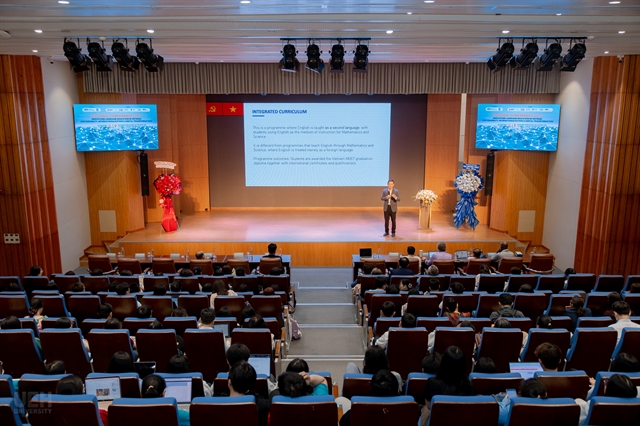 Society
Society


|
| Prof. Dr. Lê Anh Vinh, president of the Việt Nam Institute of Educational Sciences, speaks at a national conference on innovating language education in Việt Nam on October 4. —VNS Photo |
HCM CITY — More than 150 researchers, educators, graduate students, policymakers, and practitioners engaged in dialogues on developing effective language education solutions amid the challenges of sustainability, internationalisation, and digital transformation at a national conference on Saturday.
The conference themed “Innovating Language Education in Việt Nam: Sustainability, Internationalisation, and Digital Transformation” featured plenary sessions and a diverse range of paper presentations, workshops, and roundtables.
Key topics under discussion included digital transformation in English language teaching and assessment, internationalisation and leadership in language education, language policy and educational leadership, career-oriented language education and business connections.
Jointly organised by the College of Economics, Law and Government – University of Economics HCM City and the Việt Nam Institute of Educational Sciences under the Ministry of Education and Training, the event provides a forum for researchers, educators, graduate students, educational administrators, and practitioners to share research findings, innovative practices, and practical experiences.
Speaking at the opening ceremony, Assoc Prof Dr Phạm Khánh Nam, rector of the College of Economics, Law and Government, said more than 150 participants and 80 submitted abstracts demonstrated not just academic curiosity, but a shared determination to ensure that Việt Nam’s language education system rises to the challenges of sustainability, internationalisation, and digital transformation.
“The ideas shared today will not only improve language education but also strengthen Việt Nam’s broader social and economic development in the global era,” he said.
Prof. Dr. Lê Anh Vinh, president of the Việt Nam Institute of Educational Sciences, said that Việt Nam’s education system can leverage integrated approaches to strengthen students’ bilingual competence and meet the demands of global integration.
Integrated curriculum is a programme where English is taught as a second language and used in core subjects such as mathematics and science.
With an integrated curriculum, students can access a world-class international curriculum with a clear and continuous learning pathway, he said.
It helps their development of global citizenship skills and intercultural understanding, he said.
Schools can enhance their reputation and competitiveness through offering an international programme, he said.
Moreover, they can access international-standard learning resources and have opportunities to learn and share best practices in implementing international programmes.
The integrated programme is not just a regulatory requirement but a strategic key for the sustainable development of international education in Việt Nam, he said.
Building an integrated programme is not only about compliance, but about shaping the future of education in Việt Nam in a global era.
However, successful implementation requires synchronised efforts in curriculum design, teacher training, assessment reform, and administrative support, he concluded. —VNS




